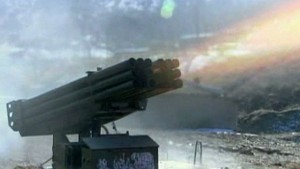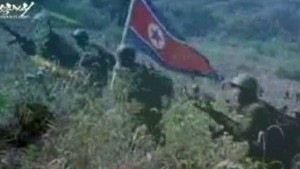It was another day of hostile, over-the-top rhetoric from the reclusive, impoverished nation led by Kim Jong Un.
But the recent missile
and nuclear tests, and the annulment of the 1953 Korean War armistice
are raising questions about the young leader.
Is his behavior erratic or staged? Is he competent enough to run a government?
 N. Korea unleashes new threats on U.S.
N. Korea unleashes new threats on U.S.
 North Korea declares it's 'combat ready'
North Korea declares it's 'combat ready'
 South Korean island haunted by war
South Korean island haunted by war
Pyongyang watchers,
reading the news and the tea leaves, say the latest hot air wafting over
the Korean Peninsula could reflect an effort to prop up appeal and
allegiance for Kim.
Is the warlike rhetoric for the folks on the home front?
Christopher Hill, a
career U.S. diplomat, said the "prolonged, rather intense" flurry of
tough talk out of Pyongyang shouldn't be ignored, but it could be
directed to the citizenry itself.
"I think there's a big
element of domestic North Korean politics, if one can understand that
concept, where clearly Kim Jong Un is not being well received," Hill
told CNN.
"I think they are trying to kind of boost his status to some sort of wartime leader."
Is this about Kim trying to consolidate power?
The UK-based Independent newspaper said Kim is working "to shore up his position."
"Not only must the new
'supreme leader' see off challengers from within North Korea's perhaps
skeptical military; he must also prove to his brutalized, often
starving, people that threats from 'foreign imperialists' must take
precedence over, say, early promises of improved living conditions.
"What better than to
conduct a nuclear test, and then use the resulting slap on the wrist
from the international community as an excuse to ready the troops, tear
up the non-aggression pact with Seoul and release incendiary propaganda
about, for example, Barack Obama perishing in a nuclear onslaught?"
Is Kim mentally stable?
Is Kim insane? David Kang and Victor Cha, writing in Foreign Policy, say "don't bet on it."
 Which North Korean threats are real?
Which North Korean threats are real?
 North Korea's war video threatens U.S.
North Korea's war video threatens U.S.
 North Korea cuts last military hotline
North Korea cuts last military hotline
They say he's a contrast
to his introverted dad, Kim Jong Il. In power for more than a year, Kim
is very much an extrovert who loves to appear in public, watch his
beloved hoops and deliver speeches.
"Much of his behavior
may be political theater aimed at convincing his own people that the
young general is comfortably in charge, but it is also a contrast with
his father's ruling style," the authors say.
"Kim Jong Il paid no
attention to the public aspect of ruling, whereas his son's visibility
and embrace of popular culture appears to be aimed at convincing North
Koreans that changes may actually occur under him."
Is Kim Jong Un more dangerous than his father?
This month, a senior administration official told CNN that Kim Jong Un was "acting in ways a bit more extreme than his father, who was colder and more calculated."
"I don't recall he ever
went this far in terms of the pace and scope of the rhetoric.
Threatening to launch nukes directly against the United States and South
Korea confirms what a lot of people have been saying, which is we are
dealing with someone new," the official added.
Another senior
administration official said Kim's youth and education abroad offered
promise for many North Korea watchers that he would be more willing to
engage with the West.
"Unfortunately, he is
following the example of his father and grandfather pretty closely," the
official said. "It's hard to be optimistic."
His grandfather, Kim Il Sung, was the founding leader of North Korea.
Where will he go beyond political theater?
Kang and Cha said the question that should be asked about Kim is whether he is turning out to be adventurous or cautious.
A risk-taking leader
"may or may not be good for North Korea and its relations with the
outside world," they say. Any major changes in foreign policy would
bring "enormous hazards." Domestic, economic and social reforms also
involve risks, they said.
"If Kim moves beyond the
political theater of the past 60 years -- chest-thumping, name-calling,
threatening to turn Seoul into a 'sea of fire' -- and actually risks a
major military strike against South Korea or even the United States, he
is putting his own neck, as well as his country's, on the line," they
wrote.
What if Kim plays it safe?
"A cautious Kim, who
simply pursues the status quo, would mean that North Korean policy will
muddle along, with no real change to the frustrating, dangerous,
decades-long game of brinksmanship," they said.
What we don't know about Kim
Fred Kaplan, writing in
Slate, said Kim Jong Il was schooled to take the reins of power. Kim
Jong Un, however, "is still an unknown quantity."
Kim Jong Un "had no
political or military experience before taking putative control of the
army, the party, and the nation." The young leader "had little time to
learn anything; his behavior is at best hard to read, and at times
bewildering."
Kaplan cites an incident
last year. President Obama agreed to provide North Koreans with food
aid if they suspended missile and nuclear tests. But Kim embarked on a
missile test before the food arrived. He touted the act after Obama
canceled the food aid and got the U.N. Security Council to condemn the
North Korean action.
He compares Kim Jong Un to his father and grandfather.
Kim Jong Il and Kim Il
Sung "would make a threat, and wait for the enemy (the United States,
South Korea, the U.N., or some combination of the above) to offer a
bribe in exchange for their forbearance. They would take the bribe --
and they'd forbear," Kaplan writes.
"But this new Kim took
the promise of a bribe -- then went ahead and carried out the threat
anyway, even before the payment, in this case desperately needed food,
came through. What the hell?"
People now want to know Kim "knows how to play his family's game," Kaplan said.
"It's always been an
odious game, but in the old days, when the father and grandfather were
around, it would end with peace, at least for a while, if the west
played along," he said.


Post a Comment